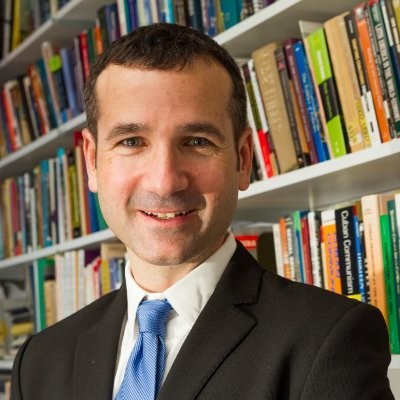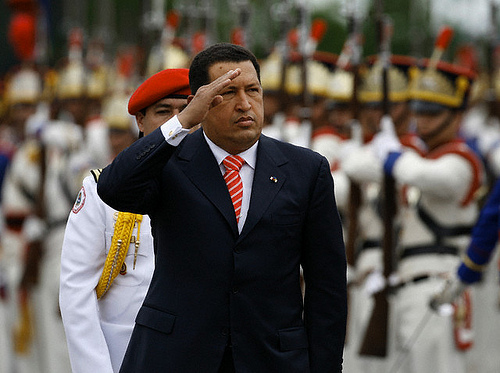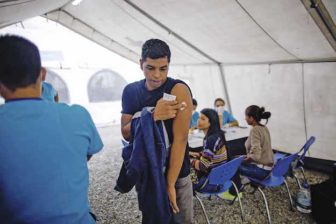Venezuela’s President Hugo Chávez is running for a third re-election this coming October. He has already released his platform. For those hoping to see Venezuela turn more democratic, this platform offers no hope.
The platform is contained in a 39-page document entitled, “Proposal from the Fatherland’s Candidate, Commander Hugo Chávez.” The document is fairly clear about what Chávez intends to do if re-elected: he will convert Venezuelan society into a state-controlled commune, and the state, into a military-controlled body.
To be sure, the “Proposal” offers a large set of ideas that are pretty unremarkable, unobjectionable, and in some cases, desirable: for example, deepen the fight against poverty, expand agricultural production, and guarantee the “survival of the human species” in the planet. Other goals are plainly unrealistic: turn Venezuela into a global “economic power,” make Venezuela into “the largest classroom in the world.” But when the document refers to military and society affairs, the goals are darn-right scary.
The military is explicitly mentioned in at least 23 paragraphs. The military is called upon not only to safeguard the borders, but also to be present in “all the structures of the Venezuelan state” (emphasis added). Chávez wants not only to increase military spending (already one of the largest in the Americas), but also to “fortify and increase” the military’s intelligence and counterintelligence services.
In fact, the document is emphatic about strengthening intelligence. Chávez calls for the actual “massification” of efforts to “search for information that is useful to protect the country.” This can only mean one thing: turn ordinary citizens into informants for state security. Chávez also wants to increase the number of “patriots” joining the Bolivarian militia—a paramilitary force directly under Chávez’ command (rather than under the command of official generals). All of this is needed to produce a “point of no return” in the effort to “pulverize completely the bourgeois state.”
To my mind, no democratically elected government in the Americas has ever been this enamored with the military. Certainly, no democracy has called for such a militarization of the state. You would think the government is getting ready to enter World War III.
Then comes the section on federalism. Long before Chávez became president, Venezuela instituted a series of reforms that established it as a relatively decentralized, federal republic, in 1989 inaugurating elections for governors, mayors and municipal councils. These subnational entities were given greater fiscal and administrative autonomy. After decades of having local officials appointed by party bosses in Caracas, Venezuelans embraced the accountability and proximity brought by the reforms. In fact, the injection of politics and competition at the local level, helped spawn new political movements and leaders, including many of the parties that supported Chávez’s first election in 1998.
Now, Chávez wants to do away with federalism. In its place, he wants to create 39,000 communal councils. This is an idea that Chávez has been toying with since 2006. It was part of his 2007 proposal to reform the constitution, but the electorate rejected it. Chávez is trying again. In fact, Chávez wants to see “68 percent of Venezuela’s population” live under the Communal Council systems by 2019.
Nothing is said about how these councils will be selected. There is no mention of democracy or elections in the more than 30 paragraphs dedicated to this topic. All that we are told is that these councils will be given the “administrative competencies” currently assigned to governors, mayors and municipal bodies. They will have “all control” over policy implementation.
Furthermore, the government plans to create a body of 4,500 “inspectors,” trained “socio-politically” (not just technically) to oversee these councils. To help these councils do their job, the government will also create 250 “Salas de Batalla Social.” The Proposal also calls for the creation of 43,029 “Prevention Committees” (or 6,174 yearly for the next six years), and all this organizational apparatus will be supervised by 3,000 government-appointed “Socialist Communes.” Strangely (and perhaps tellingly) the platform provides no details about the territorial distribution, selection methods or budget authorities of any of these parallel state entities.
These two sets of proposals, on the military and the societal organizations do more than just end Venezuela’s decentralization. They are nothing less than a call for the pyramidization of Venezuelan society under state tutelage, and the re-orientation of the state under greater military command. It is an affront not just to federalism but to pluralism and the checks and balances of modern-day government. It’s as if the totalitarianism that we thought got buried in the Twentieth Century is planning a comeback in a country that is 3-hour flight from Miami and one of the United States’s key oil supplier.
In the United States, where there is an abundance of veto players, we are used to discount party platforms as mostly promises. But in Venezuela, Chávez has a pretty good track record of delivering on what he promises regarding state-society relations. In the 1998 election, Chávez promised to end the party system, and he did. In the 2000 elections, he promised to expand state control over oil, and he did. In the 2006 he promised to accelerate nationalizations, and he did. There is no reason to doubt him this time.









